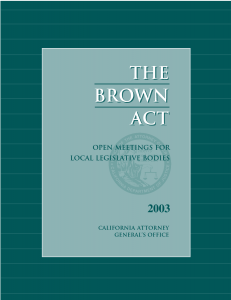Prop. 30 silver lining: Open meeting law restored
by CalWatchdog Staff | December 21, 2012 1:24 am
 [1]Dec. 21, 2012
[1]Dec. 21, 2012
By John Hrabe
Taxpayers have billions of reasons to gripe about Proposition 30 and one reason to cheer.
Gov. Jerry Brown’s multi-billion dollar tax initiative[2] contained a little-known and frequently misunderstood[3] provision that effectively restored the state’s open meeting law for local governments and special districts.
Under the state’s landmark Brown Act, local and special district agencies are required to publicize an agenda at least 72 hours prior to any meeting and then deliberate in a public and transparent process. “All meetings of the legislative body of a local agency shall be open and public, and all persons shall be permitted to attend any meeting of the legislative body of a local agency,” the law’s key provision states.
From questionable government contracts to employee pay raises to sweetheart development deals, there’s no end to what government agencies might hide. In 1953, it took Assemblyman Ralph Brown just 686 words and one page[4] to codify why government shouldn’t be allowed to operate in secret. Yet, this unambiguous language hasn’t stopped government agencies from finding creative ways to thwart the law. Over the years, courts have repeatedly weakened good government attempts to enforce the law.
Reimbursement inflation: 33 minutes per agenda item
State law requires the California Legislature to reimburse local agencies for any state-imposed mandates. One evasive maneuver, which has been commonly employed by local governments, is to inflate these reimbursement costs that are billed to the state.
A February 2011 LAO report [5]exposed a few of the absurd price tags for drafting an agenda. In 2008-09, the Mesa Consolidated Water District demanded $12,852 to create the agendas for 74 board meetings. In a majority of cases, Mesa Consolidated officials took the standard meeting reimbursement rate. When the agency didn’t request a standard reimbursement, it claimed “33 minutes of staff time (at a $75.21 hourly rate) for each item on the other agendas.”
This high reimbursement cost caused the state to gut the Brown Act in this year’s budget. The Orange County Register’s Brian Joseph reported [6]that the temporary suspension of the Brown Act saved the state $96 million in local government and special district reimbursement costs.
Not anymore. The reimbursement scam ended with Prop. 30.
“In the past, the state has reimbursed local governments for costs resulting from certain provisions of the Brown Act (such as the requirement to prepare and post agendas for public meetings),” explained the Legislative Analyst’s Office in its independent analysis of Proposition 30.[7] “This measure specifies that the state would not be responsible for paying local agencies for the costs of following the open meeting procedures in the Brown Act.”
The state’s leading open government advocacy group has praised this substantial change.
“Proposition 30, Governor Brown’s revenue measure approved by the voters, contained a little-publicized provision that amended the state constitution to say that from now on, no existing or future Brown Act requirement will be eligible for new state reimbursement claims by local agencies,” explained Terry Francke, General Counsel of Californians Aware. “No more claims; no more cascading state debt to pay for routine activities like posting meeting agendas; no more time-outs from the open meeting law.”
Secret government: What they’re hiding
Following the state’s Brown Act suspension, numerous government agencies throughout the state announced their intentions to voluntarily comply with the Brown Act. The California League of Cities, the taxpayer-funded association of city officials, adopted a resolution [8]“to voluntarily comply with the spirit of the Brown Act.”
Francke warns that voluntarily compliance is insufficient.
“The problem is that when these agencies want to slide something by public attention using a misleading agenda listing, or adding a controversial item for action that was never mentioned on the agenda, the mandate suspension means that nothing can be done about it using the courts,” he explained to CalWatchdog.com earlier this year. “That cripples the enforcement of open government and accountability via disclosure.”
That’s what happened in San Diego earlier this summer. County supervisors replaced [9] “Chief Administrative Officer Walt Ekard within four hours of his announced resignation — even though the matter was not noticed 72 hours in advance,” according to the U-T San Diego[10]. In response to an open government group’s request for an explanation, the county chief deputy counsel dismissively wrote that there is “no legal basis for threatening or bringing a lawsuit for failure to comply with (Government Code) section 54954.2 because that section is no longer operative.”
In an email to open-government supporters, Francke added that state legislation is now needed to restore other provisions that were temporarily suspended by the Legislature. State Sen. Leland Yee, D-San Francisco, who has authored several open government bills[11], is expected to introduce legislation next year.
“Every government body owes it to its constituency to make its agendas — which must be prepared for its elected officials anyway — available to the public in advance and to report its actions,” the Los Angeles Daily News recently editorialized[12]. “Fulfilling those obligations is a cost of doing business for each city, county, school district and special district, and should not depend on reimbursement from the state or anyone else — other than the taxpayers who pay for it already.”
- [Image]: http://www.calwatchdog.com/?attachment_id=35791
- multi-billion dollar tax initiative: http://voterguide.sos.ca.gov/propositions/30/
- frequently misunderstood: http://www.sandiegoreader.com/weblogs/ive-got-issues/2012/oct/24/california-prop-30-ends-the-brown-act-open-governm/
- 686 words and one page: http://www.firstamendmentcenter.org/californias-sunshine-law-celebrates-50-years
- February 2011 LAO report : http://www.lao.ca.gov/handouts/Conf_Comm/2011/Open_Meeting_2_24_11.pdf
- Orange County Register’s Brian Joseph reported : /Users/John/Downloads/taxdollars.ocregister.com/to-help-balance-the-budget-state-suspends-key-provision-of-open-meetings-law/159304/
- in its independent analysis of Proposition 30.: http://vig.cdn.sos.ca.gov/2012/general/pdf/30-title-summ-analysis.pdf
- adopted a resolution : http://www.cacities.org/UploadedFiles/LeagueInternet/cc/ccb363ab-0f2d-409c-8691-9f712482b3da.pdf
- replaced : http://www.utsandiego.com/news/2012/sep/17/county-citizen-open-meetings-law-suspended/
- according to the U-T San Diego: http://www.utsandiego.com/news/2012/sep/17/county-citizen-open-meetings-law-suspended/
- several open government bills: http://sd08.senate.ca.gov/news/2012-09-28-governor-signs-open-government-bill
- Los Angeles Daily News recently editorialized: http://www.dailynews.com/news/ci_22067678
Source URL: https://calwatchdog.com/2012/12/21/prop-30-silver-lining-open-meeting-law-restored/